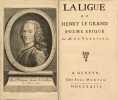4174 books for « a de voltaire »Edit
-
Type
Book (4172)
New book (1)
Old papers (1)
-
Latest
Last 24h (2)
Last 3 days (5)
Last month (47)
Last week (7)
-
Language
English (4)
French (4162)
Russian (8)
-
Century
17th (1)
18th (480)
19th (856)
20th (1181)
21st (144)
-
Countries
Belgium (119)
Canada (16)
Côte d'Ivoire (7)
Denmark (22)
France (3615)
Germany (80)
Greece (7)
Italy (3)
Switzerland (295)
United States of America (10)
-
Syndicate
ALAC (15)
CLAM (18)
CLAQ (2)
CNE (13)
ILAB (2049)
NVVA (63)
SLACES (63)
SLAM (1894)
SNCAO (13)
Topics
- Anonymous (13)
- Anticlerical (7)
- Arouet (357)
- Atheism (8)
- Bachaumont (7)
- Beaumarchais (9)
- Bibliophilism (23)
- Biography (42)
- Books from the xviiith (12)
- Brunelleschi (20)
- Catherine ii (7)
- Children’s books (7)
- Classic literature (10)
- Condorcet (9)
- Curiosa (11)
- D'alembert (16)
- Dictionaries (14)
- Diderot et d'alembert (19)
- Early printed books (118)
- Education (10)
- Education - morals (10)
- Encyclopaedia (14)
- Engraving (books about) (8)
- Ethic (15)
- First edition (60)
- Francheville (7)
- Francheville (7)
- French literature (44)
- Gallimard (11)
- Geneva (7)
- Gravelot (8)
- Henry iv (8)
- History (247)
- Illustrated books (44)
- Language (7)
- Literary criticism (21)
- Literature (18)
- Littérature 18ème (26)
- Louis xiv of france (11)
- Memories (7)
- Modern comic (25)
- Modern illustrated book (7)
- Modern times (14)
- Molière j. b. poquelin (12)
- Moreau le jeune (15)
- Newspapers press (8)
- Numbered edition (7)
- Paris (21)
- Perrault charles (11)
- Philosophy (319)
- Pléiade & album de la (71)
- Poetry (86)
- Policy (15)
- Prussia (7)
- Psychology (51)
- Racine jean (12)
- Reading vocabulary (7)
- Religions (21)
- Reliure (52)
- Rousseau jean jacques (10)
- Russia (24)
- Saint andrew (10)
- School (8)
- Sciences (16)
- Sweden (30)
- Tales (92)
- Theatre (156)
- Travel (13)
- Various (33)
- Voltaire (3429)
- Xviii th century (612)
Oeuvres complètes de Voltaire (6 volumes)
Paris, Paulin, Libraire-Editeur, 1836, 6 volumes in-8 de 220x140 mm environ, Tome premier en 2 parties, 1848 pages (pagination continue sur les 2 volumes) - Tome deuxième en 2 parties, 2168 pages (pagination continue sur les 2 volumes) - Tome troisième en 2 parties : 2235 pages (pagination continue sur les 2 volumes), reliures signées, demi maroquin à coins chocolat, dos à nerfs portant titres tomaisons et date dorés, gardes marbrées, têtes dorées, feuillets non rognés avec fréquents petits défauts de marge. Quelques rousseurs et pages légèrement brunies, petites déchirures dans les marges, certaines restaurées (Tome 1, deuxième partie p. 1600, et tome 3, première partie p.1101), des erreurs de pagination dans le tome II, p. 937 à 944 (cahier 118) sans manque, et dans le même volume cahier 220 (8 pages) mal numéroté (sans manque), frottements sur les nerfs coupes et coins. Imprimé sur 2 colonnes par page.
Tables de matières : Tome premier : Théâtre, La Henriade, La Pucelle d'Orléans, Poèmes, Discours en vers sur l'homme, Odes, Stances, Epigrammes imitée de l'Anthologie grecque, Epîtres, Contes en vers, Satires, Poésies mêlées, Essai sur les Moeurs et l'Esprit des Nations, Supplément aux Siècle de Louis XIV, Précis du Siècle de Louis XIV, Histoire de Charles XII, Histoire de l'Empire de Russie sous Pierre-le-Grand.Tome Deuxième : Annales de l'Empire, HIstoire du Parlement de Paris, Fragmens historiques sur l'Inde et sur le Général Lally, Mélanges historiques, Politique et Législation, Physique, Philosophie, Dialogues et Entretiens philosophiques, Dictionnaire philosophique, Romans, Facéties.Tome Troisième : Mélanges Littéraires, Commentaires sur Corneille, Corresponce, Mémoires, Commentaire historique, Liste par ordre alphabétique des correspondans de Voltaire. François-Marie Arouet, dit Voltaire, né le 21 novembre 1694 à Paris et mort dans la même ville le 30 mai 1778 (à 83 ans), est un écrivain, philosophe et homme d'affaires français qui a marqué le XVIIIe siècle. Merci de nous contacter à l'avance si vous souhaitez consulter une référence au sein de notre librairie.
La Princesse de Babylone. Par Mons. de VOLTAIRE.
A Paris, Javal et Bourdeaux, 1928, 1 volume in-folio de 325x255 mm environ, 88 pages, en feuillets sous couverture rempliée imprimé en vert avec vignette sur le premier plat, dans un écrin de soie vieux rose titré or, avec intérieur molletonné en soie vert olive et ruban assorti (ruban détaché), fermé par deux boutons pressions, notes manuscrites sur la première garde blanche. Edition illustrée de 15 compositions en couleurs de Cappiello gravées sur cuivre par Lorrain, dont 14 hors texte. Toutes les gravures sont en quadruple état : en bleu, en noir, en deux couleurs et état définitif en couleurs. Exemplaire N° 37, un des 40 exemplaires sur Japon Impérial, portant la signature de Cappiello. Toile de l'écrin insolée et tachée, coins frottés, mors en partie fendus, intérieur bon état.
La Princesse de Babylone est un conte philosophique, écrit par Voltaire en 1768.Ce conte met en scène deux amants : Amazan le berger et Formosante, princesse de Babylone. Comme dans Candide, les amants séparés se recherchent dans l'Asie et l'Europe. À travers leurs mésaventures, et grâce à l'humour, Voltaire fait passer ses idées et critiques sur la religion, la condition humaine et les différentes sociétés de son temps. De ce point de vue, ce conte s'inscrit pleinement dans la philosophie des Lumières. Merci de nous contacter à l'avance si vous souhaitez consulter une référence au sein de notre librairie.
Théâtre de Voltaire. (9 volumes)
A Paris, Chez Antoine-Augustin Renouard, 1809, 9 volumes in-8 de 210 x 130 mm, de 380 à 551 pages chacun, chaque colume comporte 1 faux-titre, 1 titre avec vignette, 1 ou 2 feuillets de notes à la suite de chaque pièce et une table des pièces in-fine. Reliures en pleine basane racinée, dos lisses ornés portant titre et tomaison dorés sur pièce de cuir rouge, roulette d'encadrement sur les plats, roulette dorée sur les coupes, tranches marbrées. Complet des 44 planches dont le portrait de Voltaire par St Aubin. Au tome 8 les pages 261 à 269 sont reliées dans le désordre (sans manque), au tome 9 les feuilles 427 à 430 les feuillets ne sont pas alignés avec le volume (sans gêne à la lecture), bon état intérieur. Coiffes, coins et coupes émoussés sur certains volumes sinon très agréable exemplaire.
Merci de nous contacter à l'avance si vous souhaitez consulter une référence au sein de notre librairie.
Candide. Illustré par Henry Lemarié.
Editions du Rameau d'Or Paul Cotinaud à Paris, sans date, 1 volume in-8 de 195x125 mm environ, 169 pages, en feuillets sous couverture rempliée illustrée et emboîtage cartonné avec bordure de l'étui rouge. Exemplaire N° 1072/1200, tous sur vélin d'Arches à la forme, illustré par Henry LEMARIE. Les aquarelles d'Heny Lemarié ont été magistralement reproduites aux pochoirs dans l'atelier de Maurice Beaufumé. Etui insolé, légères décharges sur les pages en regard des illustrations, sinon bon état.
François-Marie Arouet, dit Voltaire, né le 21 novembre 1694 à Paris, ville où il est mort le 30 mai 1778 (à 83 ans), est un écrivain et philosophe français qui a marqué le XVIIIe siècle et qui occupe une place particulière dans la mémoire collective française et internationale. Merci de nous contacter à l'avance si vous souhaitez consulter une référence au sein de notre librairie.
Corneille - Crébillon - Molière - Regnard - Racine - Voltaire P. Scarron - Quinault - Rotrou - La Fontaine - Hauteroche - Marivaux - Lanoue Lemierre - J.-J. Rousseau - Fabre d'Eglantine - Colin d'Harleville - Beaumarchais - Barthe - Collé - La Harpe - De Belloi - Rochon de Chabanne - Diderot - Guimont de Latouche - Fagan - Lachaussée - Campistron - Dancourt - Boissy - Bruéys et Palaprat - Lafosse - D'Allainval - Piron - LeSage - Houdart - Poisson - Destouches - Dufresny - Baron - Boursault - Lefranc de Pompignan
Reference : 108989
Répertoire du Théâtre Français (25 volumes).
Paris, Bazouge-Pigoreau Editeur, rue des Beaux-Arts, N° 14, 1834, 25 volumes in-18 de 130x75 mm environ répartis en deux séries, Tomes 1 à12, Premier ordre et Tomes 13 à 25, Second ordre, pagination continue sur le début de la série entre 700 et 800 pages (sur 2 volumes), demi basane vert bouteille, titres et tomaisons dorés sur dos lisses, ornés de filets et fers dorés, gardes et tranches marbrées. Des rousseurs (fortes par endroits) et pages brunies, des erreurs de pagination sans manque (confirmé par les signatures), coins et coupes frottés, petites déchirures et défauts de marge sur quelques feuillets mais joli ensemble décoratif (conforme à la description de la BNF).
Pierre Corneille : Le Cid - Horace - Cinna, ou La Clémence d'Auguste - Polyeucte, Martyr - La Mort de Pompée - Le Menteur - Rodogune - Héraclius - Don Sanche d'Aragon - Nicomède - Sertorius - Psyché - Ariane - Le Comte d'Essex, - Crébillon : Atrée et Thyeste - Electre - Rhadamiste et Zénobie, - Molière : L'Etourdi - Le Dépit Amoureux - Les Précieuses Ridicules - Sganarelle, ou le Cocu imaginaire - Don Garcie de Navarre, ou le Prince jaloux - L'Ecole des Maris - Les Fâcheux - L'Ecole des Femmes - La Critique de l'Ecole des Femmes - L'Impromtu de Versailles - La Princesse d'Elide - Le Mariage forcé - Don Juan, ou le Festin de Pierre - L'Amour Médecin - Le Misanthrope - Le Médecin malgré lui - Le Sicilien ou l'Amour Peintre - Le Tartuffe - Amphitryon - L'Avare - George Dandin, ou Le Mari confondu - Monsieur de Pourceaugnac - Le Bourgeois Gentilhomme - Les Fourberies de Scapin - La Comtesse d'Escarbagnas - Les Femmes Savantes - Le Malade imaginaire, - Racine : La Thébaïde, ou les Frère Ennemis - Alexandre-le-Grand - Andromaque - Les Plaideurs - Britannicus - Bérénice - Bazajet - Mithridate - Iphigénie - Phèdre - Esther - Athalie, - Regnard : Le Joueur - Le Distrait - Attendez-moi sous l'Orme - Le Retour imprévu - Les Folies amoureuses - Les Ménechmes, ou les Jumeaux - Le Légataire, - Voltaire : Oedipe - Brutus - Zaïre - Adélaïde du Guesclin - Alzire - Le Fanatisme, ou Mahomet le Prophète - Mérope - La Mort de César - Sémiramis - Nanine, ou le Préjugé vaincu - Oreste - Catilina, ou Rome sauvée - L'Orphelin de la Chine - Tancrède, - P. Scarron : Jodelet, ou le Maître-Valet - Don Japhet d'Arménie, - Rotrou :Venceslas, - Quinault : La Mère Croquette ou les Amants Brouillés, - Montfleury : La Femme Juge et Partie - La Fille Capitaine, - La Fontaine : Le Florentin - La Coupe enchantée, - Hauteroche : Le Deuil - Crispin Médecin - Le Clocher supposé - L'Esprit Follet, ou la Dame invisible, - Campistron : Andronie - Le Jaloux désabusé, - Boursault : Le Mercure Galant ou la Comédie sans titre - Les Fables d'Esope, ou Esope à la Ville - Esope à la Cour, - Dancourt : Le Chevalier à la Mode - La Maison de Campagne - L'Eté des Coquettes - Les Bourgeoises à la Mode - Le Tuteur - Les Vendanges de Surêne - Les Vacances - Les Curieux de Compiègne - Le Mari retrouvé - Les Bougeoises de qualité - Les Trois Cousines - Le Galant Jardinier - Les Femmes d'intrigues, - Baron : L'Homme à Bonnes Fortunes - La Coquette et la fausse Prude, - Bruéys et Palaprat : Le Frondeur - L'Avocat Patelin, - Lafosse : Manlius, - Dufresny : L'Esprit de contradiction - La coquette du village - Le Mariage fait et rompu, - Houdart de Lamotte : Inès de Castro, - Poisson : Le procureur arbitre, - Destouches : Le Philosophe marié - Le Glorieux - Le Dissipateur, - Boissy : Les Dehors trompeurs, - LeSage : Crispin Rival de son Maître - Turcaret, - Marivaux : Le Legs - Les Fausses Confidences - Les Jeux de l'Amour et du Hasard - Piron : La Métromanie, - D'Allainval : L'Ecole des Bourgeois, - Fagan : Les Originaux, - Lachaussée :L'Ecole des Mères, - Lefranc de Pompignan : Didon, - Lanoue : Mahomet second - La Coquette corrigée, - Gresset : Le Méchant, - Guimont de Latouche : Iphigénie en Tauride, - Lemierre : La Veuve du Malabar, - Saurin : Spartacus - Béverlei, - Diderot : Le Père de Famille, - Rochon de Chabanne : Heureusement, - De Belloi : Le Siège de Calais - Gabrielle de Vergy, - La Harpe : Mélanie - Philoctète - Coriolan, - Collé : La Partie de Chasse de Henri IV, - Favart : Les Trois Sultanes, ou Soliman II, - Champfort : La Jeune Indienne, - Sedaine : Le Philosophe sans le savoir - La Gageure imprévue, - Beaumarchais : Eugénie - Le Barbier de Séville - Le Mariage de Figaro, ou La Folle Journée - L'Autre Tartuffe, ou la Mère coupable, - Barthe : Les fausses infidélités, - Colin d'Harleville : Les châteaux en Espagne - L'Optimiste - M. de Crac - Le vieux Célibataire, - Fabre d'Eglantine : Le Philinte de Molière - L'Intrigue épistolaire, - J.-J. Rousseau : Pygmalion. Merci de nous contacter à l'avance si vous souhaitez consulter une référence au sein de notre librairie.
L'homme aux quarante écus.
A Paris, Par la Compagnie des Libraires Associés, 1768, 1 volume in-12 de 172x105 mm environ, 102 pages, demi maroqui à coins cerise, dos à nerfs portant titre et date dorés, tranche de tête dorée, gardes marbrées. Ex-libris du libraire-éditeur H. Baillière sur le premier contreplat. Petits frottements sur le cuir, sinon bon état.
Edition publiée la même année que l'originale. L'Homme aux quarante écus est un conte philosophique de Voltaire, paru en 1768. Merci de nous contacter à l'avance si vous souhaitez consulter une référence au sein de notre librairie.
Contes de Guillaume Vadé - Supplément du Discours aux Welches Avec une Lettre du Libraire de l'Année Littéraire à M. V. - Lettre du Lévite Joseph Ben-Jonathan, à Guillaume Vadé, Accompagnée de Notes plus utiles
Sans lieu et Sans mention d'Editeur, 1764 (pour les deux premiers textes), A Amsterdam, chez Abraham Root, 1765 (pour le dernier texte), 1 volume in-8 de 200x125 mm environ,contenant 3 textes reliés ensemble, xvi-386 + 1 feuillet de table-21-(1)f-28 pages, (3) ffb, plein veau marbré cognac, dos à nerfs portant titres dorés sur pièce de titre en maroquin bordeaux, orné de caissons à fleurons et petits fers dorés, gardes marbrées, tranches mouchetées de rouge. Quelques rousseurs et pages brunies, coiffes légèrement ébréchées avec début de fente sur les mors, coins émoussés, coupes un peu frottées, cuir taché par endroits avec quelques rayures, sinon bon état.
François-Marie Arouet, dit Voltaire, né le 21 novembre 1694 à Paris, ville où il est mort le 30 mai 1778 (à 83 ans), est un écrivain et philosophe français qui a marqué le XVIIIe siècle. En avril 1764 paraît anonymement un recueil intitulé Contes de Guillaume Vadé. Merci de nous contacter à l'avance si vous souhaitez consulter une référence au sein de notre librairie.
Contes et Romans (3 volumes).
Jean de Bonnot 1979 3 Jean de Bonnot, 427p+425p,429p, 1979, in-8 reliure plein cuir noir avec motifs dorés. Tranches supérieures dorées. Les tranches sont légèrement salies, bas du dos du Tome deux cogné (sans gravité). bon état général.
Merci de nous contacter à l'avance si vous souhaitez consulter une référence au sein de notre librairie.
L'ingénu. Histoire véritable tirée des manuscrits du père Quesnel.
blaizot 1927 in-4 plein maroquin signé bernasconi goix Paris, Auguste Blaizot, 1927, 1 volume in-4 de 220x270 mm, 176 pages, (2)ff. (table des illustrations, justification du tirage gravée). Un des 300 exemplaires numérotés sur Velin de Rives, complet des illustrations à leau-forte par Bernard Naudin (en-têtes, culs-de-lampe, filigranes, planches). Belle reliure signée Bernasconi et Goix, plein maroquin bleu nuit, dos à cinq nerfs portant titres dorés et caissons richement ornés, deux filets dorés et beaux écoinçons inscrits dans un double encadrement sur les plats, toutes tranches dorées et double filet doré sur les coupes, bel encadrement des contreplats, gardes marbrées, couvertures conservées. Quelques frottements sur les coins et les coiffes, discrètes marques sur le plat inférieur et les mors, sinon intérieur frais, bon état, très bel exemplaire.
Merci de nous contacter à l'avance si vous souhaitez consulter une référence au sein de notre librairie.
Contes et romans. (5 volumes)
L'Edition d'Art H. Piazza, Paris, 1927, 5 volumes brochés de 110 x 160 mm environ, XVII-263 pages-(1) f. (table); XXII-255 pages-(1) f. (table); XIX-269 pages-(1) f. (table); XV-245 pages-(1) f. (table); XVIII-252 pages-(1) f. (table). Un des 100 exemplaires sur Japon impérial, numéroté 52, en grande partie non coupé. Brochés, regroupés sous deux chemises cartonnées aux titres dorés sous emboîtages. Frottements sur les emboîtages, dorures légèrement passées, deux étiquettes de couleur collées sur les chemises mais intérieur très frais, ensemble en bel état.
Merci de nous contacter à l'avance si vous souhaitez consulter une référence au sein de notre librairie.
Histoire de l'empire de Russie sous Pierre Le Grand, par l'Auteur de l'histoire de Charles XII.
Sans lieu ni mention d'éditeur [Genève, Cramer], 1759- 1763 [1761], 2 volumes in-8 de 195 x 120 mm environ, frontispice aux deux médailles, XXXIX pages, 302 pages - (2) ff. (faux-titre, titre), XVI pages, 318 pages, (1) f. blanc. Pleines reliures d'époque, dos à 5 nerfs portant titres et tomaisons dorés sur pièces de cuir, caissons ornés, coupes filetées, gardes marbrées. Frontispice et bois gravé in-texte (plan) présents, sans les cartes de la Russie. Mors fragilisés, une coiffe manquante et des épidermures, des rousseurs, état correct malgré les défauts signalés.
Merci de nous contacter à l'avance si vous souhaitez consulter une référence au sein de notre librairie.
Pièces de théâtre, tragédies.
Sont reliées ensemble : Brutus (Delalain, 1777, 44 p.), Irène (Duchesne, 1779, 35 p.), Mahomet ou le fanatisme tragédie en cinq actes (Delalain, 1787, 40 p.), Orphelin de la Chine (Delalain, 1787, 44 p.), Béverlei tragédie bourgeoise imitée de l'anglais (Delalain, 1784, 56 p.), Roland tragédie-lyrique mise en trois actes (Didot, 1787, 24 p.), Jean Hennuyer évêque de Lizieux drame (Neaulme, La Haye, 1779, 40 p.), Eugénie drame en cinq actes (Delalain, 1785, 48 p.).
Reliure XVIIIè siècle, dos cinq nerfs, triple liséré doré sur les plats, bon état. Merci de nous contacter à l'avance si vous souhaitez consulter une référence au sein de notre librairie.
Recueil de 11 pièces.
, , 1765-1768. 1. VOLTAIRE. Le Philosophe ignorant. Genève, Cramer, 1766. In-8 de VII-(1)-168 pp. 2. VOLTAIRE. L’Homme aux Quarante Écus. Sans lieu, 1768. In-8 de 124 pp. 3. VOLTAIRE. Les Droits des hommes et les usurpations des autres. Traduit de l'italien. Amsterdam (Genève, Cramer), 1768. In-8 de 48 pp. 4. VOLTAIRE. L’Épître aux Romains, par le comte Passeran. Traduit de l'italien. (Genève, Cramer, 1768). In-8 de 42 pp. Manque le faux-titre.5. VOLTAIRE. La Profession de foy des théistes, par le comte Da... au R.D. Traduit de l'allemand. (Genève, Cramer, 1768). In-8 de 39 pp., titre en rouge et noir.6. VOLTAIRE. A Mademoiselle Clairon. Sans lieu, 1765. In-8 de 4 pp.7. VOLTAIRE. Réponse de M. de Voltaire à M. l'abbé d'Olivet, etc. (Paris, 1767). In-8 de 18 pp. 8. VOLTAIRE. Lettre sur les panégiriques, par Irénée Aléthès, professeur en droit dans le canton suisse d'Uri. (Genève, Cramer, 1767). In-8 de 15 pp.9. [LARCHER (Pierre-Henri)]. Supplément a la Philosophie de l'histoire de feu M. l'abbé Bazin, nécessaire à ceux qui veulent lire cet ouvrage avec fruit. Amsterdam, Changuion. 1767. In-8 de 309-(1) pp. 10. [GUÉNÉE (Antoine)]. Lettre du rabin Aaron Mathathaï à Guillaume Vadé, traduite du hollandois par le lévite Joseph Ben-Jonathan, et accompagnée de notes plus utiles. Amsterdam, A. Root, 1765. In-8 de 24 pp.11. [LARCHER (Pierre-Henri)]. Réponse a la Défense de mon oncle, précédée de la Relation de la mort de l'abbé Bazin ; et suivie de l'Apologie de Socrate, traduite du grec de Xénophon. Amsterdam, Changuion, 1767. In-8 de 64 p. Manque le feuillet B4 (pages 27-28). 11 pièces reliées en 1 vol. in-8, veau marbré, dos orné à nerfs, pièce de titre en maroquin rouge, tranches rouges (reliure de l'époque).
1. Tirage différent de l’originale. Titre et texte divisé en 56 paragraphes, encadrés. À la suite se trouvent quatre petits morceaux : "Petite digression [sur les Quinze-vingt, ou les Aveugles juges des couleurs"], "Avanture indienne, traduite par l'Ignorant», "Petit commentaire de l'Ignorant sur l'"Éloge du Dauphin de France"", composé par M. Thomas", "Supplément au Philosophe ignorant : André Destouches à Siam". L'Oeuvre imprimé de Voltaire à la B.N., 40772. Édition faite d'après la deuxième édition de Genève, publiée l'année de l'originale. Des extraits de ces rêveries physiocratiques furent d'abord imprimés dans le Mercure de France, juillet et août 1768. Ce livre est dirigé contre la Richesse de l'État de Roussel de La Tour (1763), et contre L'Ordre naturel et essentiel des sociétés politiques de Le Mercier de La Rivière (1767). « C'est une oeuvre de progrès, célébrant la marche de la raison, de la tolérance, de l'expérience, à l'instar des autres écrits issus de ce Ferney que Voltaire, seigneur de village, a organisé et revalorisé à l'instar de la métairie de Candide. La parole rejoint ici les actes. L'une et l'autre étant exemplaires » (J. Vercruysse). Bengesco, 1482 ; L'Oeuvre imprimé de Voltaire à la B.N., 2797. 3. Édition originale. Cette diatribe contre les papes est composée de sept articles. Le point de départ est de savoir si un prêtre du Christ devrait être souverain ; Voltaire rejette la prétendue suzeraineté des papes sur tout royaume « Les papes n'ont pas un pouce de terre en souveraineté qui n'ait été acquis par des troubles ou par des fraudes ». La cour de Rome condamna l'ouvrage le 11 août 1769. Bengesco, 1767, 1 ; L'Oeuvre imprimé de Voltaire à la B.N., 4182. 4. Édition originale. Bengesco, 1764, 1 ; L'Oeuvre imprimé de Voltaire à la B.N., 4172. 5. Édition originale. Ouvrage adressé au roi de Prusse, la dernière initiale P., étant probablement omise. Bengesco, 1762 ; L'Oeuvre imprimé de Voltaire à la B.N., 4166.6. Épître versifiée publiée sans notes sous le voile de l'anonyme, adressée à l'actrice Claire Josèphe Hippolyte Léris de La Tude dite Mademoiselle Clairon (1723-1803) qui créa de nombreuses pièces de Voltaire. Bengesco, n 806, 2 ; L'Oeuvre imprimé de Voltaire à la B.N., 2190.7. Édition originale. Le titre de départ porte : "Réponse de M. de Voltaire à M. l'abbé d'Olivet sur la nouvelle édition de la "Prosodie", à Ferney, 5 janvier 1767". La lettre est suivie de la satire : "Éloge de l'hypocrisie”. Bengesco, n°1944 ; L'Oeuvre imprimé de Voltaire à la B.N., 5034.8. Édition originale. Bengesco, n°1740 ; L'Oeuvre imprimé de Voltaire à la B.N., 4107.9. Édition originale attribuée à Larcher dont le Supplément est en réalité une réponse à La Philosophie de l'histoire. Par feu l'Abbé Bazin (Amsterdam, chez Changuion, 1765) publiée par Voltaire ; la pièce servit aussi comme Introduction aux Nouveaux mélanges philosophiques, critiques, etc. Dès 1769, Voltaire figura sous le titre de Discours préliminaire, en introduction à l'Essai sur les moeurs dans le tome VIII des oeuvres publiées par Cramer. L’Oeuvre imprimé de Voltaire à la BN, 3090.10. Édition originale. Attribuée à tort par Barbier à Voltaire, cette lettre est en réalité de l'abbé A. Guénée. Bengesco, n°2391.11. Édition originale. Par P.-Henri Larcher, d'après Barbier. "La Défense de mon oncle" a été publiée en 1767 par Voltaire, en réponse au "Supplément à la Philosophie de l'histoire de feu M. l'abbé Bazin, nécessaire à ceux qui veulent lire cet ouvrage avec fruit", dû à P.-H. Larcher et publié la même année. L'Oeuvre imprimé de Voltaire à la B.N., 4115.
CONTES ET ROMANS : Candide ou l'optimisme / Le monde comme il va / Le crocheteur borgne / Zadig ou la destinée / Memnon ou la sagesse humaine / Micromégas / Lettre d'un Turc sur les fakirs / La princesse de Babylone / Jeannot et Colin / Aventure indienne / Aventure de la mémoire / Le taureau blanc / Eloge de la raison / Histoire de Jenni / Les oreilles du Compte de Chesterfield / Les aveugles juges des couleurs / L'ingénu / Cosi-Sncta / Les deux consolés / Scarmentado / Songe de Platon / Histoire d'un bon Bramin / Le blanc et le noir / L'homme aux quarante écus / Les lettres d'Amabed (3 volumes).
Jean de Bonnot 1979 Jean de Bonnot, 3 volumes, 1979, reliures éditeur noires avec de petits lions dorés, tranche supérieure dorée, environ 21x14cm, bon état.
Illustration de Charles Monnet et de Clément Pierre Marillier. Merci de nous contacter à l'avance si vous souhaitez consulter une référence au sein de notre librairie.
Le crocheteur borgne (conte, 1746).
Pierre Gaudin 1971 Paris, Imprimerie Pierre Gaudin, René Jeanne, 1971, 20 p. volantes non numérotées, broché, environ 20x11cm, un bois en frontispice signé de Pierre Gaudin, exemplaire numéroté 52 /100, bon état.
Merci de nous contacter à l'avance si vous souhaitez consulter une référence au sein de notre librairie.
La princesse de Babylone.
Editions du Trianon, Coll. Grande Collection Trianon, 1930, 293 p., broché, l'un des exemplaires sur vélin de Rives avec un frontispice en supplément, illustrations de Léon-Zack, bords et mors de la couverture frottés, manque de papier sur le haut du dos, intérieur propre.
Merci de nous contacter à l'avance si vous souhaitez consulter une référence au sein de notre librairie.
[Recueil de pièces publiées autour de 1760].
, , 1753-1767. 13 pièces reliées en 1 vol. in-12, veau havane marbré, dos orné à nerfs, pièces de titre en maroquin rouge, tranches rouges (reliure de l'époque).
Recueil annoté à l'encre du temps, précédé d'une table des titres manuscrite. Toutes les pièces sont de Voltaire, sauf mention contraire.1.VOLTAIRE. Le Huron, ou l'Ingénu. Seconde édition. À Lausanne, 1767 (Paris, Lacombe). 2 parties en 1 vol. in-12 de (2)-118-120 pp. Deuxième édition publiée l'année de l'originale, la première sous le titre du Huron. Relié sans les deux faux-titres (parties I et II). L'Oeuvre imprimé de Voltaire à la Bibliothèque Nationale, 2824 ; Bengesco, n° 1471.2. [GIRAUD (Claude Marie)]. Épître du diable à M. de V***. A Genève. Sans lieu, 1760. In-12 de 21 pp. Edition originale. Vignette gravée sur le titre. Bengesco, 2330.3. VOLTAIRE. Réponse de M. de Voltaire aux Épîtres du Diable. Sans lieu, 1762. In-12 de 8 pp. Deuxièmé édition. Relié sans le feuillet de titre. Oeuvre imprimé, 5575 ; Bengesco, 23304. VOLTAIRE. Relation de la maladie, de la confession, de la mort et de l'apparition du jésuite Bertier, avec la Rélation du voyage de Frère Garassise, et ce qui s'ensuit, en attendant ce qui s'ensuivra. Sans lieu (Genève, Cramer), 1760. In-12 de 54 pp. Troisième édition. Facétie qu'on attribua aussi à Grimm mais qui est bien de Voltaire. L'Oeuvre imprimé de V., 3882 ; Bengesco,1641.5. [COYER (Gabriel-François)]. Lettre au R. P. Berthier, sur le matérialisme. A Geneve (Paris), 1759. In-12 de 77 pp. Edition originale.6. VOLTAIRE. Les Quand, notes utiles, sur un discours prononcé devant l'Académie françoise, le 10 mars 1760. Sixième édition, augmentée des Si et des Pourquoi (de l'abbé Morellet). À Genève, (1760). In-12 de 20 pp. Contrefaçon imprimée en rouge, vraisemblablement lyonnaise car imprimée sur papier du Forez. Libelle dirigé contre Le Franc de Pompignan. L'Oeuvre imprimé de V., 3900 ; Bengesco, 1644.7. VOLTAIRE. Les VII "quand" en manière des VIII de M. de V***, ou Lettre d'un apprenti bel-esprit qui ne manque pas de sens commun, à M. son père, en province, pour lui donner bonne opinion de lui. S.l.n.d. (1760). In-12 de 11 pp. L'Oeuvre imprimé de V., 3906.8. VOLTAIRE. Les Car, à M. Le Franc de Pompignan. Par M. de V… S.l.n.d. (Genève, Cramer, 1761). In-16 de 4 pp. Premier tirage. Titre de départ seulement. Écrit à l'occasion de la publication par Le Franc de Pompignan de l'Éloge historique de Mgr le duc de Bourgogne (Paris, 1761). L'Oeuvre imprimé de V., 3882 ; Bengesco,1665.9. VOLTAIRE. Le Codicile de Monsieur de Voltaire, trouvé dans ses papiers après son décès. Genève, 1762. In-12 de 13 pp. Edition originale. Oeuvre imprimé, 5434 ; Bengesco, 2385, 2.10. VOLTAIRE. Le Russe à Paris. Sans lieu, 1760. In-12 de 16 pp. Tirage publié l'année de l'originale. Le titre de départ indique petit poème en vers alexandrins, composé à Paris au mois de mai 1760 par M. Ivan Alethof, secrétaire de l'ambassade russe. Le poème est suivi de notes. L'Oeuvre imprimé de V., 2382 ; Bengesco, 688. 11. VOLTAIRE. Lettre de M. de Voltaire, de l'Académie Française, à M. l'abbé d'Olivet, chancelier de la même Académie au Château de Ferney, 20 août 1761. S.l.n.d. (Paris, 1761). In-12 de 15 pp. Tirage parisien publié l'année de l'originale. Titre de départ. Au sujet du Commentaire sur Corneille, des conditions de souscription et des principaux souscripteurs. L'Oeuvre imprimé de V., 5033 ; Bengesco, 1937.12. VOLTAIRE. [Oeuvres mêlées d'un auteur célèbre, qui s'est retiré de France. Berlin (Paris), 1753.] In-12 de 45 pp. Tirage inconnu de Bengesco et l'Oeuvre imprimé de V. - relié sans la page de titre. Recueil à pagination continue, qui contient : Diatribe du Docteur Akakia ; Décret de l'Inquisition, et Rapport des professeurs de Rome, au sujet d'un prétendu président, Le Jugement des professeurs du Collège de la sapience ; Défense de Milord Bollingbroke, par le Docteur Good Natur'd Wellwisher, chapelain du comte de Chesterfield, traduit de l'anglois. L'Oeuvre imprimé de V., 3869 et Bengesco, 2180 pour un tirage de 60 pp. 13. VOLTAIRE. Lettre civile et honnête à l'auteur malhonnête de la Critique de l'Histoire universelle de M. de V***", qui n'a jamais fait d'Histoire universelle, le tout au sujet de Mahomet. À Genève, 1760. In-12 de 44 pp., titre encadré. Edition originale. Réponse à l'ouvrage anonyme Critique de l'Histoire universelle de M. de Voltaire, au sujet de Mahomet et du mahométisme. L'Oeuvre imprimé de V., 5033 ; Bengesco, 3897.
La Pucelle d’Orléans. Poëme. Divisé en quinze livres. Par monsieur de V***. Édition originale et premier tirage rarissime de La Pucelle condamnée par décret le 20 janvier 1757, l’un des chefs-d’œuvre du siècle des Lumières.
Précieux exemplaire à marges immenses (hauteur 175 mm) des bibliothèques Lurde et Ruble. Louvain (Francfort?), 1755. Petit in-8 de (2) ff., 161 pp. Plein maroquin citron, chiffre doré dans les angles des plats, dos à nerfs orné du même chiffre doré et répété, double filet or sur les coupes, roulette dorée intérieure, tranches dorées. Motte. 175 x 105 mm.
Édition originale et premier tirage – rarissime - de l’un des chefs-d’œuvre du siècle des Lumières, attaque violente de Voltaire contre la superstition et la religion. Bengesco, i, 478; Le Petit, Éditions originales françaises, pages 546-547; Catalogue de livres rares du baron de Ruble, n°261 (le présent exemplaire); La Pucelle a été condamnée par décret de la cour de Rome du 20 janvier 1757 (Index librorum prohibitorum. Modoetioe, 1850. In-16, p. 262). En septembre 1757, à Paris, huit particuliers, imprimeurs et relieurs, furent condamnés au carcan dans la Grève, et à trois ans de bannissement, par suite de la découverte d’une imprimerie clandestine trouvée dans la rue de Seine, faubourg Saint-Victor, et où, dit Barbier, «il s’agissait de vers contre des personnes constituées en dignités, de la Pucelle d’Orléans de Voltaire, et autres pareils ouvrages». «Longtemps désavoué par Voltaire qui ne s’en donnait pour l’auteur que dans l’intimité, ce poëme, devenu si fameux, parut d’abord en 1755». P. Larousse. «Cette satire ne respecte rien ni personne, témoin la visite de ce moine benêt, Lourdis, au royaume de la Sottise, où se trouvent réunies toutes les bêtises humaines et que le poète décrit minutieusement et avec verve: ainsi que le fameux épisode de la lutte céleste entre saint Denis, qui est pour les Français et saint Georges, qui en tient pour les Anglais. Aucun scrupule d’ordre moral ne trouble l’inspiration allègre de Voltaire; c’est cette désinvolture étincelante, jointe à la vivacité de la satire qui fait de ‘La Pucelle’ un chef-d’œuvre». Dictionnaire des Œuvres. «Le XIe chant et l’épisode de l’âne, le plus scabreux du poème, furent composés de 1738 à 1748; Voltaire, en voyant imprimé l’épisode de l’âne dans l’édition donnée par le capucin Maubert (Louvain, 1755, in-12), poussa les hauts cris et porta plainte au lieutenant de police, disant que c’était une infamie de le persécuter comme l’auteur de ce chant obscène; il est bien certain, cependant, qu’il est de lui, et quand il se plaignait «des vers détestables et des turpitudes révoltantes» dont les copies qui circulaient étaient pleines, il savait à quoi s’en tenir, car il en avait émaillé lui-même ces copies, afin de pouvoir les désavouer. Tout cela ne serait plus excusable aujourd’hui; mais il faut tenir compte de la situation de la presse à cette époque, de l’arbitraire qui la bâillonnait, du pouvoir qu’avait encore le clergé de faire brûler le livre et quelquefois l’auteur. Réduit à se cacher, Voltaire chargeait d’obscénités et de vers l’œuvre qu’il aurait voulu faire seulement badine». P. Larousse. Voltaire avait une affection particulière pour ce livre qu’il appelait «ma Jeanne». La composition de La Pucelle d’Orléans commencée en 1730 se fit progressivement sur une vingtaine d’années. Voltaire envoyait les chants à mesure de leur rédaction à des amis et relations, notamment M. d’Argental, le duc de La Vallière, Frédéric II de Prusse et la marquise de Pompadour, si bien que de nombreux manuscrits se trouvèrent en circulation. Des rumeurs contradictoires coururent: les unes laissaient entendre que Voltaire avait pris à son service des copistes pour produire de multiples manuscrits comportant des vers sulfureux et des turpitudes qu’il insérait à dessein. L’autre version des faits, plus officielle, affirmait que Voltaire était indigné par les altérations inadmissibles apportées à son poème. Cette réputation sulfureuse fit qu’« un véritable marché noir s’organisa et l’ont comptait, d’après les journaux de l’époque, plus de six mille copies donnant souvent un texte falsifié» ( BN, Voltaire, n°331). En 1755 parut enfin l’édition originale en quinze livres (par M. de V***, à Louvain) que Voltaire, par prudence, refusa d’assumer, fidèle en cela à son principe: « Les philosophes doivent être comme les petits enfants: quand ceux-ci ont fait quelque chose, ce n’est jamais eux, c’est le chat qui a tout fait.» La même année sortirent d’autres éditions à des enseignes différentes. La dispersion des lieux d’impression était le seul moyen de pallier la faiblesse de la production et la lenteur des transports. C’était aussi le meilleur moyen de tourner les interdictions. (Rappelons que La Pucelle sera condamnée par décret de la cour de Rome en janvier 1757, et que huit imprimeurs et relieurs furent condamnés la même année au carcan et à trois ans de bannissement! ). Voltaire se résolut, en 1762, à en donner une première édition officielle à Genève chez Cramer. Précieux et bel exemplaire à très grandes marges (hauteur 175 mm) provenant des bibliothèques Lurde et Ruble (Cat. 1899, n°261).
Elémens de la philosophie de Neuton, mis à la portée de tout le monde. Edition originale de l’un des premiers grands textes de Voltaire.
L’introduction des idées de Newton en France et la victoire de l’empirisme sur le cartésianisme. Amsterdam, chez Jacques Desbordes, 1738. In-8 de (1) f. de titre, 399 pp. et (1) p. d’errata; 1 portrait de l’auteur, 1 frontispice, 7 planches hors texte dont une dépliante, 50 culs-de-lampe et vignettes, 60 figures géométriques dans le texte, titre imprimé en rouge et noir, 4 numéros de page grattés. Plein maroquin rouge, triple filet doré encadrant les plats avec fleurons d'angles, dos lisse orné, coupes ornées, roulette intérieure dorée, tranches dorées. Relié par Derome le jeune avec son étiquette. 212 x 132 mm.
Somptueux exemplaire sur grand papier conservé dans son éclatante reliure en maroquin rouge signée de Derome le jeune. Le présent exemplaire est le seul cité par Cohen conservé en maroquin rouge de l’époque. Provenances prestigieuses: le libraire parisien Guillaume-Luc Bailly ; probablement Pierre-Antoine-François Dincourt d’Hangard (Paris, 9 mars 1789, n° 468) ; probablement le prince Sigismond Radziwill (Paris, 22 janvier-1er février 1866, n° 433) ; Frédéric-Léon de Janzé (Paris, 20-24 avril 1909, n° 136 du catalogue) ; Robert Schuhmann ; Raphaël Esmérian. Edition originale, second tirage,de l’un des premiers grands textes de Voltaire, imprimée à Amsterdam par Jacques Desbordes en 1738. Cohen, Guide de l’amateur de livres à gravures du XVIIIe siècle, 1037-1038; Bengesco 1570 ; L Oeuvre imprimé de Voltaire à la B.N., 3744; Norman Library 2165. L’un des très rares exemplaires de l’édition originale imprimés sur grand papier vergé fort. Newton est la grande figure qui domine les sciences au XVIIIe siècle. Promoteur de la physique expérimentale, c’est lui qui met à jour la loi d’attraction universelle. Voltaire prend une part active à la diffusion des découvertes de celui-ci en les rendant accessibles aux non-spécialistes par la publication de ses Elémens. Le présent ouvrage marqua une étape importante dans l’histoire des sciences en France et contribua à provoquer la victoire de l’empirisme et de la méthode expérimentale sur le cartésianisme. «One of [Newton’s] greatest champions in France was Voltaire, whose ‘Elémens de la Philosophie de Neuton’, 1738, was widely read». (PMM, 161). Voltaire se propose ici d’exposer, sous une forme élémentaire et à des fins de vulgarisation, les théories et les découvertes de Newton. Il commença la composition de son principal ouvrage scientifique pendant l’été de 1736, inspiré par les études mathématiques et scientifiques de la marquise du Châtelet et l’exemple du jeune italien Francesco Algarotti. Il propose de convertir les Français au newtonianisme et de mettre la science à la portée du public en adoptant un ton sérieux, des illustrations géométriques et des calculs. Après les opinions métaphysiques de Newton, Voltaire expose ses découvertes dans le domaine de la physique, qui apparaissaient alors comme des nouveautés parfois surprenantes, parce qu’elles allaient à l’encontre des doctrines cartésiennes qui avaient triomphé jusqu’alors. Les découvertes sur la nature de la lumière, sur son mouvement en ligne droite, sur l’existence du vide, sur la propriété qu’a la lumière de se refléter et de se rétracter, sur la formation des images dans l’œil, sur l’attraction qui détermine la réfraction, sur la décomposition de la lumière blanche, et donc sur la nature des couleurs, sur le vrai caractère de l’arc-en-ciel, sur la correspondance entre les couleurs et les notes musicales, sur les lois de la gravitation céleste, sur l’explication des lois de l’attraction dans l’univers et sur la terre, sont mises par Voltaire, avec son élégance et sa vivacité habituelles de style, à la portée d’un lecteur quelconque, même ignorant de la physique. Voltaire, réfugié en Hollande en 1736, y remit au libraire Ledet les premiers chapitres des «Elémens de la philosophie de Neuton». Sa correspondance établit que l’ouvrage parut à son insu, avant qu’il eût envoyé la fin du 23e chapitre et le 24e ; malgré sa réticence, l’éditeur hollandais fit achever cette édition par un mathématicien anonyme et ajouta au titre les mots: «Mis à la portée de tout le monde». C’est Madame du Châtelet, à laquelle était dédié l’ouvrage qui, dans sa lettre à Maupertuis du 9 mai 1738, accuse le libraire hollandais d’avoir fait des additions au titre. Voltaire résolut de faire réimprimer son livre à Paris, dès 1738. Cet ouvrage est illustré d’un frontispice allégorique dessiné par Dubourg et gravé sur cuivre par Folkéma. Souhaitant insister sur le rôle capital joué par Madame du Châtelet dans la publication de ce texte, c’est Voltaire lui-même qui composa ce frontispice où on l’aperçoit travaillant à son bureau à la composition des Elémens. Trônant sur un nuage, Newton se trouve juste au-dessus de lui, pointant de sa main un compas sur un globe céleste tout en fixant du regard Madame du Châtelet qui lui fait face. L’ouvrage est également illustré d’un portrait de l’auteur gravé par Folkéma, de 7 planches hors texte dont une dépliante et de 108 vignettes dans le texte par Dubourg, Folkéma, Konder, Decave, B. Picart et Schley: un emblème au titre, 49 bandeaux et culs-de-lampe (4 bandeaux différents en répétitions, 5 culs-de-lampe différents en répétitions) et 58 représentations scientifiques. Avec 3 diagrammes scientifiques gravés sur bois dans le texte. Somptueux exemplaire sur grand papier conservé dans son éclatante reliure en maroquin rouge signée de Derome le jeune. Le présent exemplaire est le seul cité par Cohen conservé en maroquin rouge de l’époque («En maroquin rouge de Derôme (reliure signée) 375 fr., vente Janzé (n°136) à M. Robert Schuhmann»). Condition de toute rareté pour ce texte capital de Voltaire qui se rencontre généralement sobrement relié en simple veau. Provenances prestigieuses : le libraire parisien Guillaume-Luc Bailly (mention manuscrite codée de celui-ci, « yif - lop », au verso de la dernière garde volante, soit, d'après le système de décryptage d'Erick Aguirre, « acheté 26 livres, valeur à la vente 54 livres ») ; probablement Pierre-Antoine-François Dincourt d’Hangard (Paris, 9 mars 1789 et jours suivants, n° 468) ; probablement le prince Sigismond Radziwill (Paris, 22 janvier-1er février 1866, n° 433), qui a acheté l'exemplaire de Dincourt d'Hangard ; Frédéric-Léon de Janzé (Paris, 20-24 avril 1909, n° 136 du catalogue) ; Robert Schuhmann (vignette ex-libris) ; Raphaël Esmérian (trace de sa vignette ex-libris, troisième partie, 6 juin 1973, n° 102 du catalogue avec reproduction p. 27).
Letters Concerning The English Nation. - [A KEY WORK OF THE HISTORY OF SCIENCE AND PHILOSOPHY]
London, 1733. 8vo. Bound in a lovely, contemporary English Cambridge-style full calf binding with a plain spine with five raised bands. Spine a bit cracked vertically and with minor loss to capitals. Corners a bit bumped and adges of boards a bit worn. Binding overall nice and tight. Small damp stain at the lower blank corner of the first few leaves, otherwise a very good, clean copy on thick, crisp paper. (16, -including preface, contents, advertisements), 253, (1), (18, -Index) pp.
The important actual first edition of this highly celebrated key work of the Enlightenment, in which the anecdote of how Newton discovered gravity (the story about Newton and the falling apple) appeared for the first time, together with the description of the difference between the physical world view of the English and the French (the ""plenum"" and the ""vacuum""). This seminal work, in which Voltaire famously depicts British philosophy, science, society and culture, in comparison to French, can be viewed as the Enlightenment equivalent to Tocqueville's ""Democracy in America"". This series of essays, which is based on Voltaire's experiences when living in England, was actually written by Voltaire mostly in English, which he mastered to perfection. It has often been presumed that the first edition of the work was that published in French in 1734, but actually, the present English edition constitutes the actual first appearance of the work as well as the version that is closest to Voltaire's intention, as the French language version is the re-written one, and the English version the original. Curiously, almost all modern English versions are translations into English of the French edition, instead of the original English version, making this edition of the utmost importance.After the original English edition of 1733, two French editions soon followed (the first in 1734). Unlike the British, the French resented the book, and already in 1734, the French Parliament issued an order for the author's arrest and condemned the work, causing the impact of it in France to be delayed. The book was burned for being ""dangerous to religion and civil order"". At the same time, the work became a bestseller in Britain, and as much as 14 editions of the work were published in the eighteenth century. ""Inspired by Voltaire's two-year stay in England (1726-8), this is one of the key works of the Enlightenment. Exactly contemporary with Gulliver's Travels and The Beggar's Opera, Voltaire's controversial pronouncements on politics, philosophy, religion, and literature have placed the Letters among the great Augustan satires. Voltaire wrote most of the book in English, in which he was fluent and witty, and it fast became a bestseller in Britain. He re-wrote it in French as the Lettres philosophiques, and current editions in English translate his French."" (Nicholas Cronk, Introduction to the Oxford's Classics edition from 1999).The great French philosopher Voltaire was greatly impressed by the philosophical and scientific achievements of the English, especially those of Newton, Locke, and Bacon. As a disseminator of scientific knowledge, Voltaire came to play a great rôle in the popularization of Newtonian science and its discoveries, the present work being a prime example. Although the work was condemned by the French authorities, it still came to play a great rôle in the spreading of Newtonian ideas in France. The present work generally came to play a dominant rôle in Enlightenment accounts of the history of science and philosophy. The work focuses on British science and thought and uses the accounts of these to emphasize what is lacking in French society and French thought. The work is generally very critical towards the French ""ancient régime"", and when Voltaire here discusses the emergence of empiricism, it is viewed as an English tradition that stands in opposition to the French rationalist tradition (with Descartes as the prime example). This view is taken over by the following Enlightenment historians of science and philosophy, e.g. d'Alembert (see for instance his ""Preliminary Discourse"" of 1751). Some of the most influential passages of the work are probably those on Bacon (who Voltaire sees as the founder of modern experimental science), Newton, and Descartes. Letters XIV, on Descartes and Newton, XV, on attraction, and XVI, on Newton's Optics (from 1704), are among the most influential essays of the work. In XVI Voltaire reflects upon Newton's ""Optics"" and the way that he rejected Descartes' theory and set out his own account of the properties of light. In XV he presents the first account of Newton and the falling apple: ""As he was walking one Day in his Garden, and saw some Fruits fall from a Tree, he fell into profound Meditation on that Gravity, the Cause of which had so long been sought, but in vain, by all the Philosophers, whilst the Vulgar think there is nothing mysterious in it. He said to himself, that from what height soever, in our Hemisphere, those Bodies might descend, their Fall wou'd certainly be in the Progression discover'd by Galileo" and the Spaces they run thro' would be as the Square of the Times. Why may not this Power which causes heavy Bodies to descend, and is the fame without any sensible Diminution at the remotest Distance from the Center of the Earth, or on the Summits of the highest Mountains" Why, said Sir Isaac, may not this Power extend as high as the Moon?..."" (pp. 127-28).But perhaps the most famous passage in the volume is the opening of Letter XIV: ""A Frenchman who arrives in London, will find Philosophy, like every Thing else, very much chang'd there. He had left the World a ""plenum"", and he now finds it a ""vacuum"". At Paris the Universe is seen, compos'd of Vortices of subtile Matter" but nothing like it is seen in London. In France, 'tis the Pressure of the Moon that causes the Tides but in England 'tis the Sea that gravitates towards the Moon" so that when you think that the Moon should make it Flood with us, those Gentlemen fancy it should be Ebb, which, very unluckily, cannot be prov'd..."" (pp. 109-10).
Letters Concerning the English Nation. - [A KEY WORK OF THE HISTORY OF SCIENCE AND PHILOSOPHY]
London, C. Davis and A. Lyon, 1733. 8vo. Lovely contemporary full Cambridge-style binding with five raised bands to spine and blindstamped ornamental borders to boards. . Double gilt line-borders to boards. All edges of boards with gilt borders. Gilt title to spine. Hinges neatly and professionally re-inforced. Internally very nice, clean, and fresh. A lovely, crisp, and large copy with good margins, printed on heavy, fine paper. (16, -including preface, contents, advertisements), 253, (1), (18, -Index) pp.
The important actual first edition of this highly celebrated key work of the Enlightenment, in which the anecdote of how Newton discovered gravity (the story about Newton and the falling apple) appeared for the first time, together with the description of the difference between the physical world view of the English and the French (the ""plenum"" and the ""vacuum""). This seminal work, in which Voltaire famously depicts British philosophy, science, society and culture, in comparison to French, can be viewed as the Enlightenment equivalent to Tocqueville's ""Democracy in America"". This series of essays, which is based on Voltaire's experiences when living in England, was actually written by Voltaire mostly in English, which he mastered to perfection. It has often been presumed that the first edition of the work was that published in French in 1734, but actually, the present English edition constitutes the actual first appearance of the work as well as the version that is closest to Voltaire's intention, as the French language version is the re-written one, and the English version the original. Curiously, almost all modern English versions are translations into English of the French edition, instead of the original English version, making this edition of the utmost importance.After the original English edition of 1733, two French editions soon followed (the first in 1734). Unlike the British, the French resented the book, and already in 1734, the French Parliament issued an order for the author's arrest and condemned the work, causing the impact of it in France to be delayed. The book was burned for being ""dangerous to religion and civil order"". At the same time, the work became a bestseller in Britain, and as much as 14 editions of the work were published in the eighteenth century. ""Inspired by Voltaire's two-year stay in England (1726-8), this is one of the key works of the Enlightenment. Exactly contemporary with Gulliver's Travels and The Beggar's Opera, Voltaire's controversial pronouncements on politics, philosophy, religion, and literature have placed the Letters among the great Augustan satires. Voltaire wrote most of the book in English, in which he was fluent and witty, and it fast became a bestseller in Britain. He re-wrote it in French as the Lettres philosophiques, and current editions in English translate his French."" (Nicholas Cronk, Introduction to the Oxford's Classics edition from 1999).The great French philosopher Voltaire was greatly impressed by the philosophical and scientific achievements of the English, especially those of Newton, Locke, and Bacon. As a disseminator of scientific knowledge, Voltaire came to play a great rôle in the popularization of Newtonian science and its discoveries, the present work being a prime example. Although the work was condemned by the French authorities, it still came to play a great rôle in the spreading of Newtonian ideas in France. The present work generally came to play a dominant rôle in Enlightenment accounts of the history of science and philosophy. The work focuses on British science and thought and uses the accounts of these to emphasize what is lacking in French society and French thought. The work is generally very critical towards the French ""ancient régime"", and when Voltaire here discusses the emergence of empiricism, it is viewed as an English tradition that stands in opposition to the French rationalist tradition (with Descartes as the prime example). This view is taken over by the following Enlightenment historians of science and philosophy, e.g. d'Alembert (see for instance his ""Preliminary Discourse"" of 1751). Some of the most influential passages of the work are probably those on Bacon (who Voltaire sees as the founder of modern experimental science), Newton, and Descartes. Letters XIV, on Descartes and Newton, XV, on attraction, and XVI, on Newton's Optics (from 1704), are among the most influential essays of the work. In XVI Voltaire reflects upon Newton's ""Optics"" and the way that he rejected Descartes' theory and set out his own account of the properties of light. In XV he presents the first account of Newton and the falling apple: ""As he was walking one Day in his Garden, and saw some Fruits fall from a Tree, he fell into profound Meditation on that Gravity, the Cause of which had so long been sought, but in vain, by all the Philosophers, whilst the Vulgar think there is nothing mysterious in it. He said to himself, that from what height soever, in our Hemisphere, those Bodies might descend, their Fall wou'd certainly be in the Progression discover'd by Galileo" and the Spaces they run thro' would be as the Square of the Times. Why may not this Power which causes heavy Bodies to descend, and is the fame without any sensible Diminution at the remotest Distance from the Center of the Earth, or on the Summits of the highest Mountains" Why, said Sir Isaac, may not this Power extend as high as the Moon?..."" (pp. 127-28).But perhaps the most famous passage in the volume is the opening of Letter XIV: ""A Frenchman who arrives in London, will find Philosophy, like every Thing else, very much chang'd there. He had left the World a ""plenum"", and he now finds it a ""vacuum"". At Paris the Universe is seen, compos'd of Vortices of subtile Matter" but nothing like it is seen in London. In France, 'tis the Pressure of the Moon that causes the Tides but in England 'tis the Sea that gravitates towards the Moon" so that when you think that the Moon should make it Flood with us, those Gentlemen fancy it should be Ebb, which, very unluckily, cannot be prov'd..."" (pp. 109-10).
La ligue ou Henry le Grand, poème épique. Édition originale de « La Henriade » en rarissime maroquin armorié de l’époque.
Exceptionnel exemplaire de l’édition originale relié en maroquin de l’époque armorié, condition absolument rarissime pour cette œuvre précoce de Voltaire. Genève [Rouen], Jean Mokpap [Viret], 1723. In-8 de viii pp., 231 pp., (1) f. bl, enrichi du portrait de Voltaire peint par La Toure. Plein maroquin olive, triple filet doré autour des plats, armoiries frappées or au centre, dos à nerfs finement orné, roulette intérieure, coupes décorées, tranches dorées sur marbrures. Reliure en maroquin armorié de l’époque. 184 x 113 mm.
Exceptionnel exemplaire de l’édition originale relié en maroquin de l’époque armorié, condition absolument rarissime pour cette œuvre précoce de Voltaire. Les originales de Voltaire en maroquin armorié valent jusqu’à dix fois le prix des exemplaires reliés en veau de l’époque. Rare édition originale imprimée secrètement à Rouen par le libraire Viret, Voltaire s’étant vu refuser la permission de l’imprimer en France. Poème en neuf chants écrits en alexandrins, La Ligue est une composition mêlant savamment événements réels et fictions puisées dans l’univers du merveilleux. Le sujet central du poème est le siège de Paris par Henri de Navarre, futur Henri IV. Voltaire trace le portrait d’un souverain idéal, ennemi de tous les fanatismes. L’œuvre, remaniée par l’auteur, paraîtra en 1728 sous le titre de La Henriade. (Bengesco, I, 360 ; L’œuvre imprimée de Voltaire à la Bibliothèque Nationale, 1669). «L’œuvre garde aujourd’hui encore de 1’importance par les sentiments profonds de tolérance religieuse et civile qui l’animent. Henri, ce héros de prédilection de la France, personnifie aussi le type de souverain éclairé qu’attendaient les gens cultivés de cette époque et dont le ‘Siècle des Lumières’ fixera définitivement les caractéristiques.» En 1584, la mort de l’héritier du trône François duc d’Alençon, et l’acceptation comme héritier par le roi de son plus proche parent en ligne masculine, le roi Henri iv, protestant, alimentent les tensions entre protestants et catholiques. Henri de Guise prend la tête d’une nouvelle Ligue. La Ligue déclare vouloir rétablir la religion unique et soustraire le roi à l’emprise de ses favoris. Ce n’est pas un hasard si Voltaire rédige La Ligue en 1723 alors que le régent, le Duc d’Orléans, vient de mourir. A son arrivée au pouvoir Louis XV poursuit la législation antiprotestante de Louisxiv. Voltaire voulut dédicacer son ouvrage au jeune Louis XV mais ce dernier refusa et la censure exigea des suppressions au texte auxquelles l’auteur ne consentit. Voltaire va alors décider de le faire imprimer secrètement à Rouen. C’est donc dans un climat d’hostilité aux protestants que paraît cette ode à Henri iv roi protestant et hymne à la tolérance, véritable satire contre le pape Clément xi qui va attiser la haine des catholiques. Précieux et rarissime exemplaire relié en maroquin olive de l’époque aux armes de Machault d’Arnouville (1667-1750). Louis-Charles de Machault, seigneur d’Arnouville, fils de Jean-Baptiste, conseiller au Parlement de Paris, et de Madeleine-Catherine de Villemontée, né le 13 juillet 1667, devint conseiller au Grand Conseil le 17 janvier 1691, maître des requêtes le 1er mars 1694 et intendant et conseiller du conseil de commerce ; il fut pourvu de la charge de lieutenant général de police de la ville de Paris le 28janvier 1718, à la suite de d’Argenson ; ayant résigné cette fonction le 5 janvier 1720, il fut nommé conseiller d’État la même année, chef du conseil de la duchesse d'Orléans et premier président du Grand Conseil en 1740. Il mourut à Paris le 10 mai 1750. Il avait épousé Françoise‑Élisabeth Milon le 19 février 1709. (Olivier-Hermal, pl. 2153).
La Henriade « La Henriade » de Voltaire
Edition de luxe et première édition illustrée de La Henriade. L’un des rares exemplaires imprimés sur papier fort de Hollande, à très grandes marges. A Londres, 1728. In-4 de (3) ff., 202 pp. et 12 planches. Collation conforme à l’exemplaire conservé à la B.n.F. Relié en plein maroquin bleu, triple filet doré autour des plats, dos à nerfs richement orné, double filet sur les coupes, roulette intérieure dorée, tranches dorées sur marbrures. Reliure du XIXe siècle signée Chambolle-Duru. 300 x 235 mm.
Edition de luxe et première édition illustrée de La Henriade de Voltaire. Bengesco, n365 ; Cohen, 1025 ; Le Petit, Bibliographie des éditions originales, pp. 534-535. Elle comporte la dédicace de Voltaire, “To the Queen” et l’édition a été remaniée par voltaire par rapport a la première de 1723. La présente édition de Londres 1728 est la première à porter le titre ‘La Henriade’ et la première qui soit complète, c’est-à-dire en dix chants. C’est d’autre part la première qui ait été faite entièrement sous les yeux de voltaire, corrigée avec soin et revue par lui. “La première qui ait été corrigée avec soin et revue par Voltaire, cette édition de luxe présente un texte parfois différent de celui de l’édition de 1723 et des suivantes, et partout ce texte est beaucoup plus correct. Cette belle édition peut donc être considérée comme la première vraiment authentique.” (Le Petit). « Les exemplaires sur papier de Hollande sont rares. » (Cohen, 1025). Elle comporte un frontispice par de Troy, gravé par Surugue, un fleuron sur le titre dessiné par Michaux, gravé par C. (Cochin), 10 grandes figures par de Troy, Lemoine, Vleughels, gravées par Desplaces, Dupuis, Tardieu, Jeaurat, Cochin, 10 vignettes dessinées par Michaux, gravées par Dupuis, Poilly, Fletcher, Lépicié, et 10 culs-de-lampe par les mêmes. « La vignette qui se trouve en tête du ‘Chant troisième’ contient le portrait, en médaillon, de la reine Elisabeth d’Angleterre. » (Le Petit) Voltaire a écrit La Henriade en l’honneur du roi de France Henri IV et de la tolérance. Le sujet central de l’ouvrage est le siège de Paris, commencé par Henri III et poursuivi par Henri de Navarre, futur Henri IV. La Henriade est un poème composé de deux parties; d’événements réels et de fictions toutes puisées dans le système du merveilleux, telles que la prédiction de la conversion d’Henri IV, la protection que lui donne le roi saint Louis IX de France, ancêtre de la Maison Royale de France, son apparition, etc. La censure avait remarqué dans le poème plus d’un endroit contenant des propositions sentant l’hérésie et elle exigeait des suppressions auxquelles l’auteur ne crut pouvoir consentir. Voltaire dut faire paraître hors de France un poème qu’il ne pouvait espérer faire publier avec l’assentiment de l’autorité, la dédicace ayant été refusée au nom du roi par le régent. Il décida alors de le faire imprimer secrètement à Rouen par Viret. Il s’agit de l’édition qui fut publiée en 1723 sous le titre La Ligue ou Henry le grand, poème épique, à Genève, chez Jean Mokpap (Rouen, Viret), in-8. Ce poème n’a que 9 chants et possède des lacunes considérables. En 1728, Voltaire se trouvait en Angleterre et venait d’essuyer une terrible banqueroute. Louis XV lui fit envoyer deux milles écus et tout Londres se pressa pour faire imprimer, par souscription, une édition de La Henriade, ce qui fut fait et rendit par la générosité de la nation anglaise sa fortune à l’auteur. Puisque Louis XV avait refusé la dédicace, Voltaire en fit l’honneur à la reine Élisabeth dont il admirait le pays et ses institutions libérales. “La Henriade garde de l’importance par les sentiments profonds de tolérance religieuse et civile qui l’animent. Ce héros de prédilection de la France personnifie aussi ce type de souverain éclairé qu’attendaient les gens cultivés de cette époque et dont le “Siècle des Lumières” fixera définitivement les caractéristiques.” Précieux exemplaire, l’un des rares imprimés sur grand papier de Hollande, à très grandes marges avec de nombreux témoins (hauteur 300 mm), revêtu d’un beau maroquin bleu du XIXe siecle de Chambolle-Duru.
Recueil de cinq ouvrages.
, , 1740-1744. La Mérope française, avec quelques petites pièces de littérature. A Paris, chez Prault fils, 1744. In-8 de (4)-XXIV-(2)-115-(1) pp. Lettre à M. Norberg, chapelain du roi de Suède Charles XII, auteur de l'Histoire de ce monarque. A Londres [Paris, Prault], 1744. In-8 de (2)-16 pp. Mahomet, tragédie. Par M. de Voltaire. Représentée à Paris pour la première fois le jeudi 10 août 1742. (Paris), 1742. In-8 de (2)-89 pp. Conseils à M. Racine sur son poème de la religion par un amateur des belles-lettres. Sans lieu, (1742). In-8 de 14 pp. Recueil de pièces fugitives en prose et en vers. Par M. de V***. (Rouen), 1740. In-8 de (4)-IV-223 pp.5 pièces reliées en 1 vol. in-8, veau blond glacé, dos orné à nerfs, pièce de titre en maroquin rouge, tranches rouges (reliure de l'époque).
1. Édition originale. 1 fleuron sur le titre par Boucher, gravé par Duflos ; Portrait de l'auteur d'après de la Tour en frontispice et 2 planches hors-texte dont une gravée par Duflos et l’autre dessinée et gravée par Fessard. Bengesco, I, 152 ; L'Oeuvre imprimé de Voltaire à la BN,1057. 2. Édition originale. La Lettre à M. Norberg quoiqu'imprimée avec une page de titre et une pagination séparée, fait partie intégrante de l'édition princeps de Mérope. Cette lettre, écrite dès la publication de la traduction française par Warhmholtz de l'Histoire de Charles XII du chapelain Jöran Anders Nordberg, dans l'édition de Hondt, est datée par Besterman de mai 1742, alors que Beuchot l'a classée à la date de février 1744. Bengesco, III, 1925 ; L'Oeuvre imprimé de Voltaire à la BN,1057. 3. Édition française donnée sans l'aveu de Voltaire faite d'après le manuscrit de la représentation parisienne, avec les noms des acteurs de la Comédie française indiqués pour chacun des personnages. Bengesco, I, 135 ; L'Oeuvre imprimé de Voltaire à la BN,1008. 4. Édition originale. Vraisemblablement parisienne. D’après Wagnière, Voltaire ne serait pas l’auteur de cet ouvrage. Bengesco, II, 1585 ; L'Oeuvre imprimé de Voltaire à la BN, 3777. 5. Contrefaçon de la deuxième édition parisienne chez Prault fils, fait à Rouen, comme en témoigne le filigrane du papier petit raisin au nom de Duval, Généralité de Rouen. « L’Essai sur le siècle de Louis XIV paraissait ici pour la première fois. Condamné et mis au pilon par l'arrêt du Conseil d'Etat du 4 décembre 1739, ce " recueil de pièces fugitives ", en prose mais surtout en vers, offre un condensé de l'insolence du premier Voltaire. Par delà la diversité de cet ensemble de productions mondaines, philosophiques, critiques, se dessine, jusque dans les pièces familières, une cohérence idéologique qui rappelle le projet dont les Lettres philosophiques (1734) ont fourni un précédent essai tonitruant. Voltaire met ici à profit l'effet de recueil, qui permet aussi d'effectuer le lancement d'oeuvres majeures comme Le Siècle de Louis XIV, tout en conférant un plus large retentissement à d'autres pièces jusque-là disséminées et réservées à un public restreint. Il affiche et met en scène à plus grande échelle une sociabilité essentielle pour la diffusion de ses textes « (Olivier Ferret, Myrtille Méricam-Bourdet). Bengesco, IV, 2193 ; L'Oeuvre imprimé de Voltaire à la BN, 371. Bel exemplaire.
Oeuvres complètes de Voltaire (70 Tomes - Complet) Tome 1 : Vie de Voltaire par M. le Marquis de Condorcet ; Tomes 2 à 10 : Théâtre ; Tome 10 : La Henriade ; Tome 11 : La Pucelle d'Orléans ; Tomes 12 à 14 : Poésies ; Tomes 15 à 18 : Essai sur les Moeurs ; Tomes 19 et 20 : Siècle de Louis XIV ; Tome 21 : Siècle de Louis XV ; Tome 22 : Histoire de Charles XII ; Tome 23 : Histoire de Russie ; Tome 24 : Annales de l'Empire ; Tome 25 : Histoire du Parlement ; Tomes 26 et 27 : Mélanges historiques ; Tomes 28 et 29 : Politique et Législation ; Tome 30 : Physique ; Tomes 31, 32, 33 et 34 : Philosophie Générale, Métaphysique, Morale et Théologie ; Tome 35 : Dialogues et Entretiens philosophiques des Oeuvres de Voltaire ; Tomes 36 à 42 : Dictionnaire Philosophique ; Tomes 43 et 44 : Romans ; Tome 45 : Facéties ; Tomes 46, 47, 48 : Mélanges Littéraires ; Tomes 49 et 50 : Commentaires sur Corneille ; Tomes 50, 51, 52 : Correspondance avec Frédéric, Roi de Prusse ; Tome 53 : Correspondance avec l'Impératrice de Russie, plusieurs Souverains et les Princes de Prusse ; Tomes 54 et 55 : Correspondance avec d'Alembert ; Tomes 56 à 69 : Correspondance Générale ; Tome 70 : Table analytique des Oeuvres de Voltaire par J. B. J. Champagnac
70 vol. in-8 reliure de l'époque demi-basane marron, dos lisse orné en long, Chez E. A. Lequien, Paris, 1820-1826, avec portrait de Voltaire gravé par Balechou en frontispice Rappel du titre complet : Oeuvres complètes de Voltaire (70 Tomes - Complet) Tome 1 : Vie de Voltaire par M. le Marquis de Condorcet ; Tomes 2 à 10 : Théâtre ; Tome 10 : La Henriade ; Tome 11 : La Pucelle d'Orléans ; Tomes 12 à 14 : Poésies ; Tomes 15 à 18 : Essai sur les Moeurs ; Tomes 19 et 20 : Siècle de Louis XIV ; Tome 21 : Siècle de Louis XV ; Tome 22 : Histoire de Charles XII ; Tome 23 : Histoire de Russie ; Tome 24 : Annales de l'Empire ; Tome 25 : Histoire du Parlement ; Tomes 26 et 27 : Mélanges historiques ; Tomes 28 et 29 : Politique et Législation ; Tome 30 : Physique ; Tomes 31, 32, 33 et 34 : Philosophie Générale, Métaphysique, Morale et Théologie ; Tome 35 : Dialogues et Entretiens philosophiques des Oeuvres de Voltaire ; Tomes 36 à 42 : Dictionnaire Philosophique ; Tomes 43 et 44 : Romans ; Tome 45 : Facéties ; Tomes 46, 47, 48 : Mélanges Littéraires ; Tomes 49 et 50 : Commentaires sur Corneille ; Tomes 50, 51, 52 : Correspondance avec Frédéric, Roi de Prusse ; Tome 53 : Correspondance avec l'Impératrice de Russie, plusieurs Souverains et les Princes de Prusse ; Tomes 54 et 55 : Correspondance avec d'Alembert ; Tomes 56 à 69 : Correspondance Générale ; Tome 70 : Table analytique des Oeuvres de Voltaire par J. B. J. Champagnac
Belle série bien complète des 70 volumes, en bon état (qq. minimes frott., rares rouss. et belle fraîcheur intérieure générale) pour ce bel et impressionnant ensemble, de belle présentation. "Imprimée par P. Didot, l'édition Lequien joint au mérite d'une belle exécution typographique celui de quelques heureuses restitutions de texte, d'après les éditions originales. C'est M. Lequien qui a publié pour la première fois (dans le tome 9 de son édition) les Originaux, ou Monsieur du Cap Vert, l'une des rares comédies vraiment gaies de Voltaire". Bengesco, IV, 2150 ; Vicaire, VII, 1137
 Write to the booksellers
Write to the booksellers
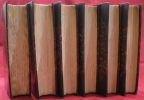

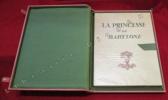
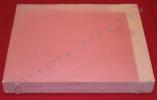

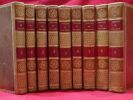




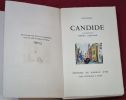

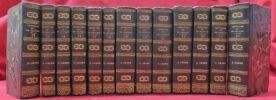
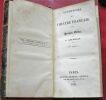
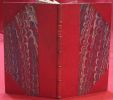







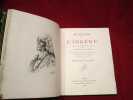

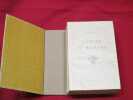

![Histoire de l'empire de Russie sous Pierre Le Grand, par l'Auteur de l'histoire de Charles XII.. [VOLTAIRE]](https://static.livre-rare-book.com/pictures/DIO/111490_1_thumb.jpg)
![Histoire de l'empire de Russie sous Pierre Le Grand, par l'Auteur de l'histoire de Charles XII.. [VOLTAIRE]](https://static.livre-rare-book.com/pictures/DIO/111490_2_thumb.jpg)
![Histoire de l'empire de Russie sous Pierre Le Grand, par l'Auteur de l'histoire de Charles XII.. [VOLTAIRE]](https://static.livre-rare-book.com/pictures/DIO/111490_3_thumb.jpg)






![[Recueil de pièces publiées autour de 1760].. VOLTAIRE (François-Marie Arouet de).](https://static.livre-rare-book.com/pictures/BON/10636_1_thumb.jpg)
![[Recueil de pièces publiées autour de 1760].. VOLTAIRE (François-Marie Arouet de).](https://static.livre-rare-book.com/pictures/BON/10636_2_thumb.jpg)
![[Recueil de pièces publiées autour de 1760].. VOLTAIRE (François-Marie Arouet de).](https://static.livre-rare-book.com/pictures/BON/10636_3_thumb.jpg)





